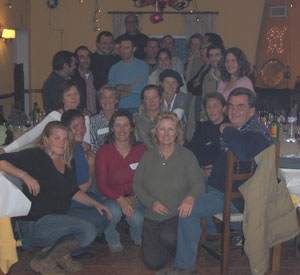
The venue for representatives of riding centres to meet is normally on the competitive fields of a horse riding event. Thursday November 29th, however, was different. Twenty four representatives, of diverse nationalities – Portuguese, German, Dutch, Brazilian and English – came together for a dinner meeting at the Juncalinho restaurant, Almancil to discuss the problems now facing the future of horse riding in the Algarve.
Lucie Cabrita, FEP official and Level II Instructor and Bev Gibbons, BHS Int.regd –both holding the International Passport for Equestrian qualifications – managed to mobilize, in just two days, members of the riding fraternity most concerned at recent events.
There are some 30 stables in the Algarve, many with a specialisation whether in show jumping, dressage training, teaching able bodied or disabled, or, in tourism. Many riders trained in the Algarve have gone on to national and international competition.
A number of these centres have recently been visited by ASAE and, as a result, two Almancil stable owners felt that there was a need for all the centres to get together and look at the laws affecting them and to “exchange notes” on what the ASAE inspectors are now looking for.
Two centres did not have complaints books – but only one was fined. Another was ticked off for not having a price list in Portuguese (their market is principally with tourists). One centre, Pinetrees, was suspended from operating from November 15th until certain pieces of paper could be obtained.
This was the only centre suspended, but perhaps, says Beverley, because she voiced her annoyance at them not having made an appointment and for harassing her staff.
Ignorance of the law is no excuse, as they say, for any of us. However, living in Portugal it can be difficult to find out about laws unless, of course, you enjoy reading the “Diário da Republica” where all the laws are published, or you read about them in some of our excellent English newspapers. It is another thing to interpret the laws and their application. Anyone in business needs to be particularly alert at the moment and check they have their “house in order” since some of these inspections sound like a visit from the “PIDE Police” as in the time of Salazar´s dictatorship!
The meeting was constructive. Lucie presented a synopsis on her detailed research on the various laws which now affect all sporting facilities.
Many of those present have years of experience and training but no recognised qualifications, and, in order to be “legal” it would be necessary to do some training courses followed by evaluation exams. Unfortunately, these are all held outside the kingdom of the Algarbes, in real Portugal, and it is difficult for those working in business to get away.
Those centres that work more in tourism will require specific training and exams but it is believed that these will enhance the service provided, ensuring a safer riding environment and contributing to the image of the Algarve as a holiday destination with quality sporting and leisure facilities.
The main point of the meeting was to create enough interest, and clout, that these exams could be brought to the Algarve, thus improving the quality in the centres and allowing them to continue and move forward.
